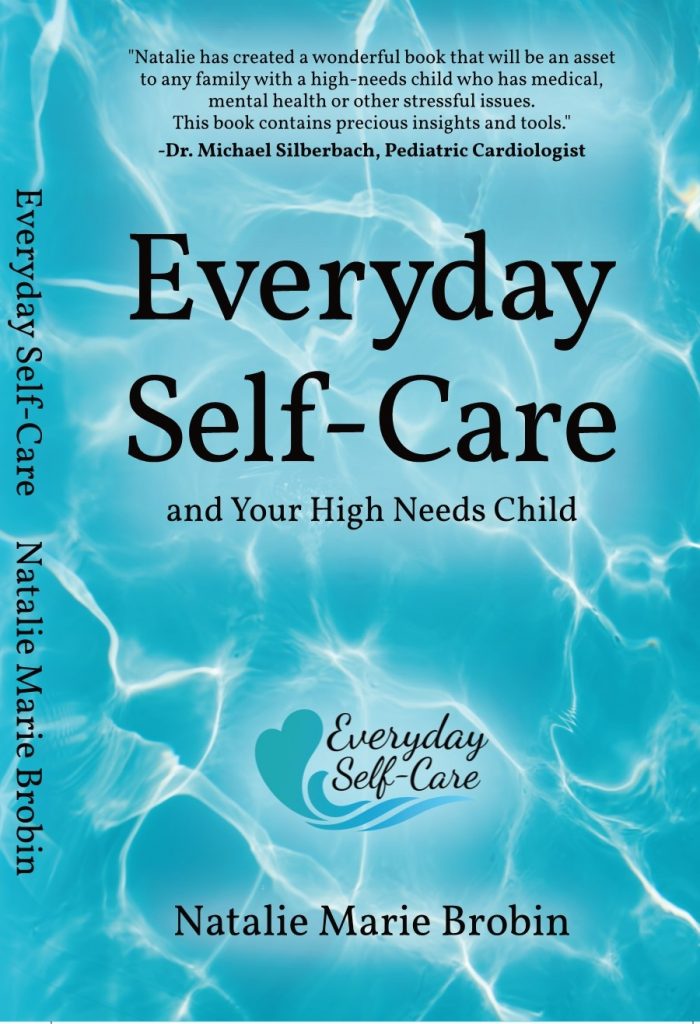By Natalie Brobin
I always knew exactly what was going on in my daughter’s health. I spent hours researching her various health conditions. Whenever she received a new diagnosis, I would head to the computer and do my research on how to manage it. If someone asked me how I was doing, I would end up telling them how my daughter was doing at the time. If my daughter was doing well, I felt good. If there was a health crisis, I felt stressed. It was that simple. My happiness revolved around her health. But then I began to wonder, does it have to be that way? I lived like this for years and years until I found better ways to cope.
Before your child was diagnosed with a complex health condition, your life was probably already busy, taking care of your kid(s), working, maintaining your home and more. After your child was diagnosed with their health condition, your world most likely turned upside down. Nothing made sense anymore, and your stress skyrocketed.
1. Find a Therapist
During such a difficult time, taking care of your own mental and emotional health is more important than ever, but the reality is that many of us don’t make it a priority.
According to Web MD Health Services, “Mental health refers to your ability to process information. Emotional health, on the other hand, refers to your ability to express feelings which are based upon the information you have processed. So, if your cognitive function is hindered by depression or anxiety, for example, you may struggle with accurately identifying a situation. This can then trigger inappropriate responses because those responses are based upon inaccurate thoughts.”
You may not even realise you have stopped taking care of your own mental and emotional health. Who can think about taking care of yourself when your child is diagnosed with a lifelong health condition? When your child is sick, you will do anything to make her healthy regardless of your own well-being. I can tell you from personal experience that this is exactly the time when you need to have strong mental and emotional health. I know I felt guilty if I took time for myself. Self-care is not indulgent. It is a necessity.
Since none of us are immune to life’s stress and/or traumas, we bring our past and current stressors into caregiving. If we don’t manage those stressors, it will make it that much harder to care for our child.
Friends and family can be a big part of your support system, but having a professional therapist at your disposal can make a huge difference in your life. You can work through current stressors as well as old ones, which will help you be a better caretaker. I also know that many of you reading this might think, “I do not have time to see a counselor!” It really helped me to see a therapist. The stress of taking care of a sick loved one cannot be overstated. Seeing a counselor regularly can help you talk through the stress of being a caregiver. What kind of therapist should you see? Depending on your situation, I suggest looking for a family or trauma therapist. Talk to friends, relatives and your insurance company for referrals.
2. Find Positive Outlets for Your Stress
There are so many easy activities that you can do to boost your mood. Do something that brings you joy! And I don’t mean how Marie Kondo uses it to get rid of unnecessary household items. Watch a funny movie. Read a book. Get outside! Take a hot, bubble bath. Crafting or gardening is another positive activity. Go on a fun family activity! Have a long talk with a good friend. Go on a date with your spouse. What do you do for stress relief?
3. Be Kind to Yourself
You will make mistakes. You will lose your temper. You will cry. And you will get frustrated. You will not do everything perfectly. My therapist asks me repeatedly, “What would a kind voice say?” On difficult days, I have a hard time answering that question. So be patient and kind to yourself. You need your own support and love more than ever.
4. Find Your Tribe
You will need to surround yourself with people who get you and can support you. This includes members of other families who understand the unique challenges of taking care of a sick child, especially if their child has the same diagnosis. This is your new or extended family. Of course, you will also look for the support of family and friends, but it can sometimes be difficult since they don’t really understand what you’re going through, especially as time goes by.
Look online for an advocacy group that supports families and patients with your child’s health issue. Here in the USA where I live, I found the Turner Syndrome Society of the United States (TSSUS)early on, and it was a lifesaver! They have numerous online resources and so much more. I also attended the yearly educational conference hosted by the TSSUS. If you find an organisation that focuses on your child’s condition, get to one if you can, although they are not cheap. At the annual TSSUS conference, I met mums and dads from around the world who are still my friends to this day. My daughter had the chance to meet other girls who were similar to her. I coined it, “the most expensive playdate ever!”
Join a Facebook group. There are so many out there for almost every health concern. I belong to a number of them. If it is a closed or private group, you may need to email an administrator to get in.
5. Ask for Help or Accept Help When it is Offered
This is hard for many. We live in a society where we are rewarded for being independent and self-sufficient. However, people do want to help. Besides cooking meals, people are sometimes at a loss of how to help. Accept their offers. Look at it this way, your friends will be grateful to help and that can make a positive difference in your life.
6. Simplify Your Life
So many things that seemed so important before are less of a big deal when you have a sick child who needs your attention. Let the house cleaning go. I don’t mean that you should turn your house into a dump, but it doesn’t have to be as clean and neat as you might be used to before your child got sick. If you can afford it, get a cleaning lady. It is money well spent.
Simplify dinners and laundry. Alternatively, accept offers from friends who want to bring meals or do your laundry. You can also ask other family members such as your children to help with the cooking and laundry. Alternatively, have some much-needed time for yourself.
You may also want to simplify your social life. It isn’t easy to get babysitters when your child has a health condition, and you may not have family close by. I know that going to the grocery store all by myself was a treat! When I ran into neighbors, I used it as social time as well!
Create your to-do list with realistic goals. I heard that you should put “make a list” at the top and cross it off. On those extra busy days, crossing off one thing can help you feel you’ve accomplished something.
7. Take Advantage of Any Resources Available to You
If you have funds for a support worker, get one! It will help your child if you have breaks from caregiving. Look into your eligibility for other services as well such as Early-Childhood Intervention. They provide services that help babies and toddlers with developmental delays or disabilities.
If your hospital or doctor’s office offer classes or support groups related to your child’s health condition, make time to attend.
As I mentioned previously, go to an annual education conference about your child’s health condition if one is available. The experience will be life-changing.
8. Exercise and Eat Healthy
I gained and lost so much weight over the years. I would get into a mode of eating healthy and working out, but some crisis would happen and it would go out the window. I really had that self-sacrificing mom thing going for me. Although an often-repeated refrain in our household was, “when mom is happy, everybody’s happy!” It really is true! To keep yourself mentally and emotionally fit, take care of your physical self as well. Try to get outside for a walk, especially if the sun is out, vitamin D can really improve your mood. A walk within nature is even better if you have access to a park, “forest bathing” is very popular these days!
Eating a balanced diet has never been more important. I have seen a big increase in articles about how healthy eating can actually improve your health. Start today!
Once you find out your child will have extra challenges ahead, your life changes instantly and becomes more stressful. There is nothing easy about taking care of your ill child, but there are positive things you can do to keep or improve your mental and emotional health.
How do you prioritise your own health when you’re the parent of a high-needs child?
Natalie Brobin’s life turned upside down when she found herself struggling to care for a daughter with a rare chromosomal disorder called Turner Syndrome, which can cause heart defects and delayed growth, among other health issues, particularly in girls. Struggling to prioritise her daughter’s health amidst the everyday madness of raising two other children and thus juggling carpools, diving practices, family commitments and neighbourhood get-togethers, Brobin eventually had a nervous breakdown after a dear friend’s death by suicide that left her determined to find another way to live. After rediscovering herself through a combination of therapy, yoga, advocacy work and writing, Brobin discovered the path to self-care for any parent of a special needs child (or even a typical one). Everyday Self-Care and Your High Needs Child provides concrete ideas on how to reduce stress through breathwork, meditation, nutrition, healthy sleep, therapy, laughter and positive outlets for stress.
Written in concise chapters, and drawing from the experience of other parents as well as the input of doctors, this book is the informed, experienced life coach in your pocket that every parent of a special needs child can use.
About the author
Natalie Brobin who has a Journalism degree writes about parenting, trauma, loss, grief and life. A registered yoga instructor and a Yoga Recovery 2.0 Coach, she’s been published in The Mighty, Thrive Global and Light Hustler. She’s also been featured in and on multiple media outlets for her advocacy on behalf of Turner Syndrome—the rare genetic disorder her daughter has. A dedicated volunteer for the Turner Syndrome Society of the United States, Brobin is currently working on a book called Everyday Self Care During Grief. Her blogs can be found at www.everydayself-care.com. She recently moved to California and enjoys daily walks on the beach.





